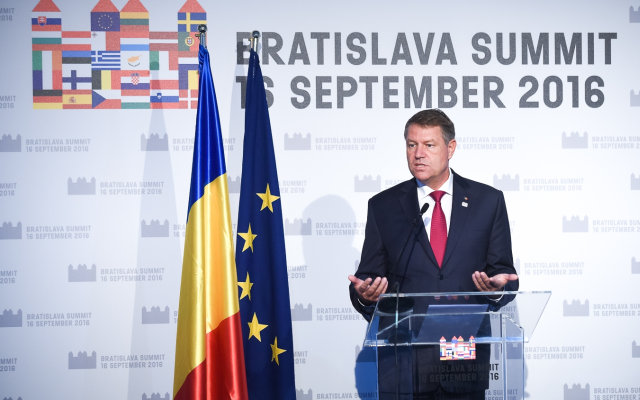The European Summit in Bratislava
The EU leaders attending the Bratislava Summit decided to make the community bloc a safer and more attractive place for their own citizens, after Great Britain expressed its wish to leave the EU

Corina Cristea, 19.09.2016, 14:07
Gathered in Bratislava, the EU leaders agreed on a 6-month deadline by which to work out a strategy that should make the community bloc a safer and more attractive place for its citizens. The final declaration of the summit hosted by Slovakia’s capital city includes key issues such as measures to keep migration in check, to fight terrorism and radicalization as well as to develop the economy through investments and the consolidation of the single market.
The summit proved that the EU was able to carry on after Great Britain’s decision to leave the community bloc, said the French President, Francois Hollande. Alongside the German Chancellor Angela Merkel, President Hollande gave assurances that Paris and Berlin pledged to have a close cooperation, in the coming months, in order to work out measures meant to ensure the success of the Union.
The Slovak PM, Robert Fico, the host of the summit, said that all the EU leaders agreed that only the EU project could ensure their countries’ prosperity and that they agreed to be more explicit as regards their plans for the future. He went on to say that he personally decided to focus on the migration issue in the coming months.
The President of the European Council, Donald Tusk, made several remarks following the discussions in Bratislava, namely that Europe should never allow for the return of uncontrolled refugee flows, should do everything necessary to support member states in ensuring internal security and fighting terrorism, also by intensifying information-exchange among security services of member states, should create a promising economic future for all and provide better opportunities for the young Europeans. According to Donald Tusk, the measures aimed at fulfilling all these goals will become part of the plan on which they will be working until March, next year. Donald Tusk expressed joy at the fact that some member states already offered their support to Bulgaria so as to protect its border with Macedonia and Greece.
The EU leaders decided to grant Bulgaria 108 million Euros to protect its borders from the increasing number of migrants and refugees. The Visegrad Group countries proposed in Bratislava a so-called flexible solidarity in dealing with the migration issue, according to which the economic development of EU members should also be taken into account when assessing the country’s capacity to receive migrants. Attending the Bratislava Summit, the Romanian President, Klaus Iohannis, said that the EU is indeed facing a number of crises, but it is not a patient with a chronic illness, it is actually a success. The Romanian President also had informal talks, on the sidelines of the summit, with several European leaders on Romania’s Schengen accession. (Edited by D. Vijeu)






























